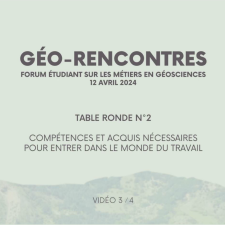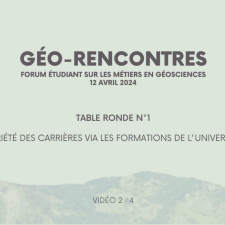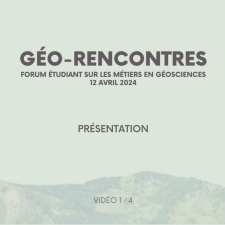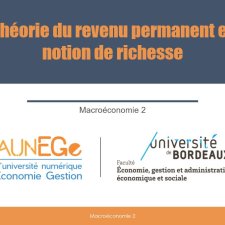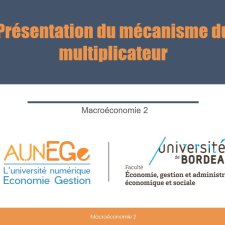Chapitres
Notice
A Roadmap to Assess the Economic Cost of Climate Change with an Application to Hurricanes in the United States
- document 1 document 2 document 3
- niveau 1 niveau 2 niveau 3
Descriptif
This talk presents a methodological roadmap to assess macro-economic damages from climate change. To do so, it explores a single manifestation of climate change in a single location: an increase in hurricane intensity in the United States. The presentation starts from a global climate change, and follows the causal chain to total macro-economic losses. First, the large-scale change is downscaled to a spatial scale pertinent to investigate socio-economic impacts. Here, the Emanuel hurricane model is used to estimate present and future local landfall probabilities. Second, a statistical analysis of historical landfalls is used to translate these probability changes into direct economic losses. The paper also discusses several adaptation strategies that could be implemented to limit these losses. Finally, a modified Input-Output model is used to investigate indirect losses due to macroeconomic mechanisms and feedbacks. This model translates the changes in direct losses into changes in total losses. The model suggests that total losses increase non-linearly, amplifying the role of the most extreme events. The paper then proposes adaptation strategies that can reduce indirect losses by improving the ability of the economy to reconstruct and deal with the consequences of disaster.
Dans la même collection
-
Comparison of Simulated Tree-Ring Cellulose d180 at the European Scale
DANIS Pierre-Alain
In order to investigate factors involved in the inter-annual variability of d180 in tree ring cellulose (d18OTRC), we simulated the d18OTRC from 1960 to 2001 over Europe. We used 1) simulated climate
-
Borehole Climatology and Model Simulations: Steps to Integrated Assessment
GONZALES ROUCO Jesus Felipe
Progress in understanding climate variability through the last millennium leans on simulation and reconstruction efforts. Exercises blending both approaches present a great potential for answering
-
Linking Adaptation and Mitigation for Climate Risk Reduction
SHOGREN Jason F.
How people privately and collectively adapt to climate risk can affect the costs and benefits of public mitigation policy (e.g., Kyoto); an obvious point often neglected in actual policy making.
-
Social Impact of global Environmental Change on Farming Communities on the Ogoli River Bank in Otuk…
ANJEINU ABU Godwin
One of the manifestations of the global change in this study area is a marked reduction in the duration and amount of rainfall. This adversely affects the volume of the head waters that ultimately
-
How to Foster the Economic and Societal Technical Solutions?
CALLONEC Gaël
The presentation will focus on the interplay between economic scenarios (based on energy demand and CO2 emission reduction) with long run-public policies. The French case will be discussed in more
-
Debate
DJéDJé Okoubi Franck Didier
MILLNER Antony
RAJ ARYAL Komal
FRAGNIèRE Augustin
The European Science Foundation (ESF) and the French Foundation of the Maison des Sciences de l’Homme (FMSH) (within the Entre-Sciences programme) have agreed to jointly develop a new conference
-
Climate Models: learning from the Past Long-Term Climate Variability
JOUSSAUME Sylvie
Projections of future climate change rely on global climate models. Such models simulate the dynamics and physics of the coupled atmosphere-ocean system and move towards models of the full Earth
-
Data-Model Fusion Approach in Global Change Research: Recent Development and Future Challenges
PENG Changhui
It is increasingly recognized that global change research requires methods and strategies for combing process models and data in systematic ways. This is leading to research towards the application of
-
The Impacts of Climate Change on Continental Ecosystems
SEGUIN Bernard
Climate change will deeply modify the ecophysiological functioningof plants, by creating a set of conditions which could be more favourable (in the sense of biomass production) or not. Among the first
-
The Economics of the Climate/Development of the Gordian Knot; Beyond a Sound Pessimism
HOURCADE Jean-Charles
We will first suggest that costs of meeting ambitious climate targets capable to stabilize global warming below 2°C or 3°C temperature increase have been underestimated so far. The first reason is the
-
Debate
CALLONEC Gaël
DUPUIS Johann
THORON Sylvie
The European Science Foundation (ESF) and the French Foundation of the Maison des Sciences de l’Homme (FMSH) (within the Entre-Sciences programme) have agreed to jointly develop a new conference
-
IPCC Working Group I and III
JOUSSAUME Sylvie
The European Science Foundation (ESF) and the French Foundation of the Maison des Sciences de l’Homme (FMSH) (within the Entre-Sciences programme) have agreed to jointly develop a new conference
Sur le même thème
-
Géo-Rencontres 2024 / Les expériences valorisées dans le monde professionnel
LILLO Emma
ARAUJO Julie
HUART Florian
DUBREU Romain
BUQUET Damien
CHAZAL Laura
BORIE Mariane
Forum sur les métiers en géosciences organisé par les étudiants du CMI Ingénierie Géologique et Civile, Université de Bordeaux, 12 avril 2024
-
Géo-Rencontres 2024 / Compétences et acquis nécessaires pour entrer dans le monde du travail
BRINON Juliette
AMOLE Fili-Fenua
PRETOU Frédéric
CAMPET Hugo
LIéBAUX Albin
DE ALEMEIDA Marie-Lou
POIRIER Aymeric
DUFRENOY Audrey
Forum sur les métiers en géosciences organisé par les étudiants du CMI Ingénierie Géologique et Civile, Université de Bordeaux, 12 avril 2024
-
Géo-Rencontres 2024 / Variété des carrières via les formations de l'université
INGUIMBERT Diane
LACAZE Romane
LEMAITRE Laurie
CHAZAL Laura
MONTJEAN Pascal
POUDEVIGNE Jacques
PORTEFAIX Frédéric
Forum sur les métiers en géosciences organisé par les étudiants du CMI Ingénierie Géologique et Civile, Université de Bordeaux, 12 avril 2024
-
Géo-Rencontres 2024 / Présentation
LATASTE Jean-François
LAVIE Théo
Forum sur les métiers en géosciences organisé par les étudiants du CMI Ingénierie Géologique et Civile, Université de Bordeaux, 12 avril 2024
-
Tokyo, plus grande « ville » au monde : aménager et gouverner la démesure
LANGUILLON-AUSSEL Raphaël
Avec ses quelques trente-cinq millions d’habitants, Tokyo est la « ville » la plus peuplée au monde, et l’une des métropoles les plus riches. Cette présentation vise à décrire, analyser et expliquer,
-
L'approche par la dépense du PIB et les grandes fonctions macroéconomiques
MAVEYRAUD-TRICOIRE Samuel
L'approche par la dépense du PIB et les grandes fonctions macroéconomiques
-
-
-
-
Les déterminants de la demande agrégée
MAVEYRAUD-TRICOIRE Samuel
Les déterminants de la demande agrégée
-
La théorie du revenu permanent et la notion de richesse
MAVEYRAUD-TRICOIRE Samuel
La théorie du revenu permanent et la notion de richesse
-
Présentation du mécanisme du multiplicateur
MAVEYRAUD-TRICOIRE Samuel
Présentation du mécanisme du multiplicateur




